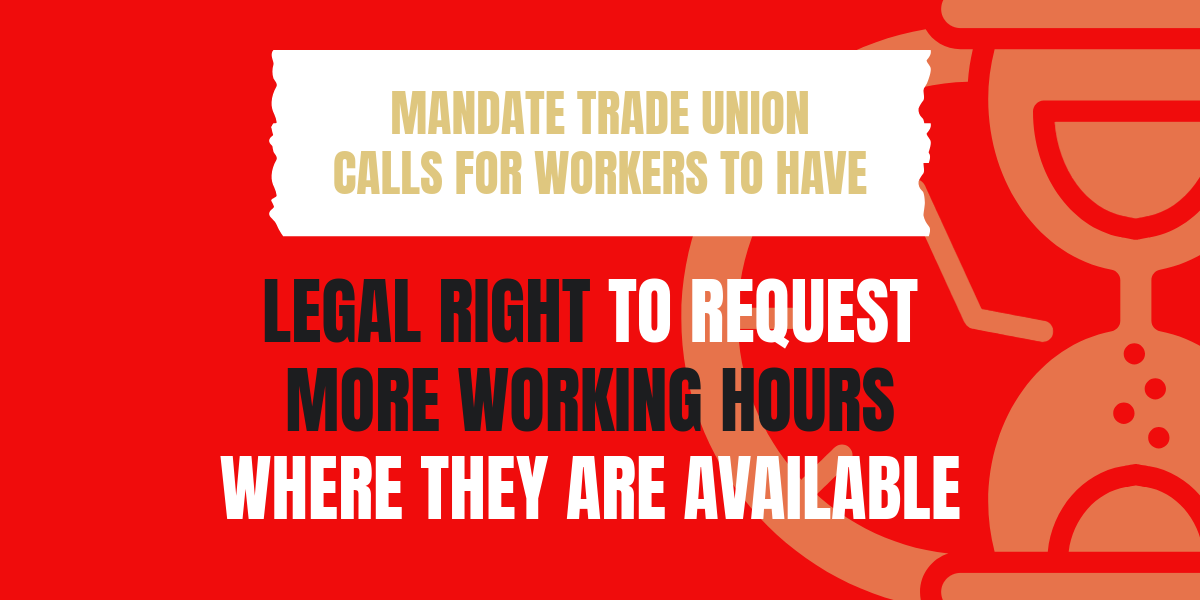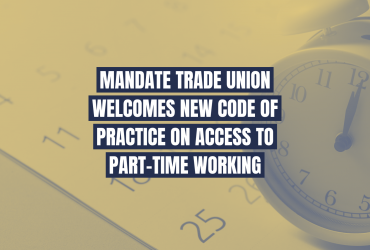
Mandate Calls for Right to Request More Working Hours
Wednesday 2 July 2025MANDATE TRADE UNION CALLS FOR WORKERS TO HAVE LEGAL RIGHT TO REQUEST MORE WORKING HOURS WHERE THEY ARE AVAILABLE
Union also calls for abolition of ‘discriminatory’ sub-minimum wage rates for younger workers
Mandate Trade Union has today called for workers to have the legal right to request more working hours where they are available. The union’s Assistant General Secretary, Jim Fuery was speaking on this matter at the Irish Congress of Trade Unions’ biennial conference in the Waterfront Hall, Belfast.
Mr Fuery explained that research conducted for Mandate amongst 3,000 of its members showed that nearly two-thirds were earning below €451 per week. The main reason for these low earnings is the low number of working hours that retail and bar workers carry out – otherwise known as involuntary underemployment.
“Nearly half of the workers in our survey said that they would like to work more than their 15 or 20 or 25 contracted hours per week. Unfortunately, management refusal to provide access to more working hours is a huge obstacle here. The reality is that it is cheaper for an employer to have two staff on 15-hours per week than to enable a worker in the 20-25 hours per week band to work 30 hours or more. This is precisely why so many retail and bar employers are refusing to give existing workers access to more hours
“Nearly 30 years ago the European Union adopted a Directive which – amongst other things – proposed that employers should enable workers to increase their working hours. While most of this Directive was introduced into Irish law in the 2018 Employment (Miscellaneous Provisions) Act this provision was not unfortunately. It’s time that this matter was sorted by amending the 2018 legislation to give workers the right to request more working hours when and where they are available.”
Turning to the issue of sub-minimum wage rates, Jim Fuery said that it is simply crass that workers under 18 can be paid 70% of the National Minimum Wage, while those aged 18 can receive 80%, and those aged 19 can be paid 90% of the national minimum wage, while carrying out the exact same work as regular, full-time employees.
“Not alone do younger workers do the same work as older workers, they also face the same high cost of living as every other worker in Ireland but on much lower wages. The Low Pay Commission recognised the discriminatory nature of sub-minimum wage rates when they proposed almost 12 months ago that they be abolished.
“Unfortunately, the current Government has decided to defer taking any action on the abolition of sub-minimum wage rates while a new Cost of Business Advisory Forum looks at its possible effects. This decision and the reasoning behind it is evidence of an even deeper discriminatory mindset within the Government – namely that we can put off doing anything about higher living costs for young people but have to tread really carefully about business costs. This is simply unacceptable in 2025 which is why the sub-minimum wage rates need to be abolished,” Jim Fuery concluded.






